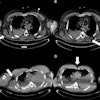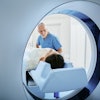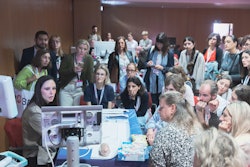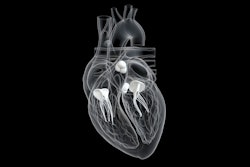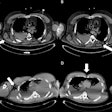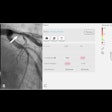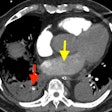Strong and concerted action is needed to limit the impact of medical imaging on the environment, according to speakers at a special session held at the annual meeting of the European Society of musculoSkeletal Radiology (ESSR) in Lugano, Switzerland.
As former U.S. President Barack Obama said, "We are the first generation to feel the impact of climate change, and the last generation that can do something about it," and radiologists must play their part and not miss this opportunity, ESSR 2024 attendees heard on 7 June during a panel discussion, "Sustainability within MSK Radiology: Clash of Generations?"
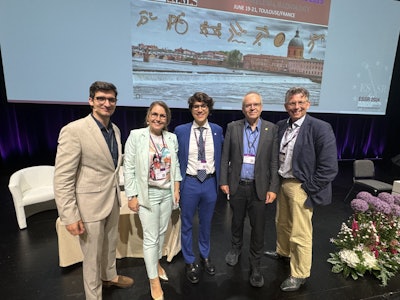 Members of the ESSR panel discussion. From the left: Dr. Vid Matišić, member of ESSR Young Club and radiology resident at St. Catherine Specialty Hospital in Zagreb; Dr. Barbora Horehleďová, chair of ESSR Young Club and radiology and nuclear medicine resident at Zuyderland Medical Center, Heerlen, the Netherlands; Dr. Marco Curti, congress youth director at ESSR 2024; Prof. Juerg Hodler, president of the International Skeletal Society and professor of radiology at Zurich University Hospital; and Prof. Mario Maas, past president of ESSR and professor of radiology at the University of Amsterdam and the Amsterdam University Medical Center. All photos courtesy of ESSR.
Members of the ESSR panel discussion. From the left: Dr. Vid Matišić, member of ESSR Young Club and radiology resident at St. Catherine Specialty Hospital in Zagreb; Dr. Barbora Horehleďová, chair of ESSR Young Club and radiology and nuclear medicine resident at Zuyderland Medical Center, Heerlen, the Netherlands; Dr. Marco Curti, congress youth director at ESSR 2024; Prof. Juerg Hodler, president of the International Skeletal Society and professor of radiology at Zurich University Hospital; and Prof. Mario Maas, past president of ESSR and professor of radiology at the University of Amsterdam and the Amsterdam University Medical Center. All photos courtesy of ESSR.
Environmental sustainability requires a change in culture, including the establishment of green teams comprising multidisciplinary groups of between four and eight professionals, panel members agreed. Such a bottom-up initiative should lead to concrete and accessible projects within a department, group, or sector, raising awareness about sustainability.
According to the World Health Organization, a sustainable healthcare system is defined as: "A system that improves, maintains or restores health, while minimizing negative impacts on the environment and leveraging opportunities to restore and improve it, to the benefit of the health and well-being of current and future generations."
To achieve sustainable practice, there's an urgent need in healthcare for knowledge, skills, and attitudes, and radiologists have a central role, particularly in the integration of sustainability into education programs because residents and students are future professionals and they are crucial for innovation, they noted.
In the learning chain, radiology interns need to collaborate on sustainability topics and present their findings to peers and staff. Continuity is important as output informs future groups of interns, and to achieve success, other essential factors are collaboration between different generations, intersection of field knowledge and young creativity, and positive energy to address complex issues, noted Prof. Mario Maas. During the discussion, he shared his experiences of the current medical curriculum in Amsterdam.
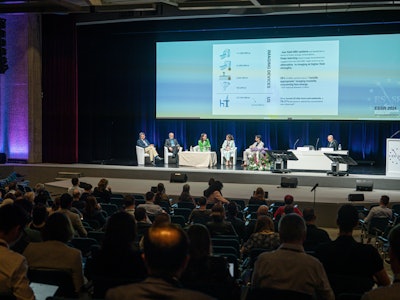 During the session, ESSR panel discussion members mapped out the green agenda facing radiology.
During the session, ESSR panel discussion members mapped out the green agenda facing radiology.
An MRI scanner typically uses 111,000 kWh/hr, compared with 41,000 kWh/hr for a CT unit, and 9,500 kWh/hr for x-ray. Low-field MRI systems are beneficial in terms of lower energy consumption, and deep learning-based image reconstruction suggests that low-field MRI might evolve as an alternative to imaging at higher field strengths, panel members pointed out.
Around 38% of MSK imaging protocols have a "usually appropriate" imaging modality that consumes less energy, according to the American College of Radiology Appropriateness Criteria. When machines are turned off after hours and over weekends, a decrease of over 75% in electricity consumption can be achieved.
A solid majority of imaging professionals agree that severe sustainability problems exist. There are always more wants than means, so choices must be made, and increasing expenditures for sustainability policies compete with very relevant needs in terms of capital investments, salaries, and time for patients, examinations, training, and science, speakers said.
The positive effects of sustainability expenditures often occur later, and they do not appear on an individual's own financial statement and/or are difficult to measure. However, the potential wider benefits are the positive impact on global warming, improved drinking water quality (e.g., due to less pollution of rivers from the release of gadolinium-based MRI contrast media), and reduced waste management cost, they added.
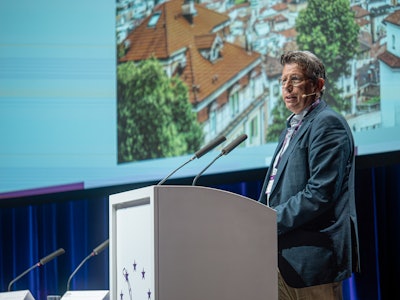 Prof. Mario Maas was the initiator of the panel discussion and acting ESSR president during the annual congress.
Prof. Mario Maas was the initiator of the panel discussion and acting ESSR president during the annual congress.
In the words of Prof. Christian Gerber, a professor of orthopedics and a visionary from Zurich, "Science is defining the future of medical practice," and science leads to innovation, influences teaching/training, and is finally being integrated into standard of care -- this also is true for sustainability, Prof. Juerg Hodler emphasized. But science must never become ideological, and it needs to use state-of-the-art methodology and always remain critical of its own results and those of others. Also, science should partner with industry in order to provide early market entry of innovative ideas about sustainability.
The panel members' take-home message was clear and simple: Your actions matter. Session moderator was Maartje Nix, change management consultant in healthcare at BdB Group, Amersfoort, the Netherlands.

